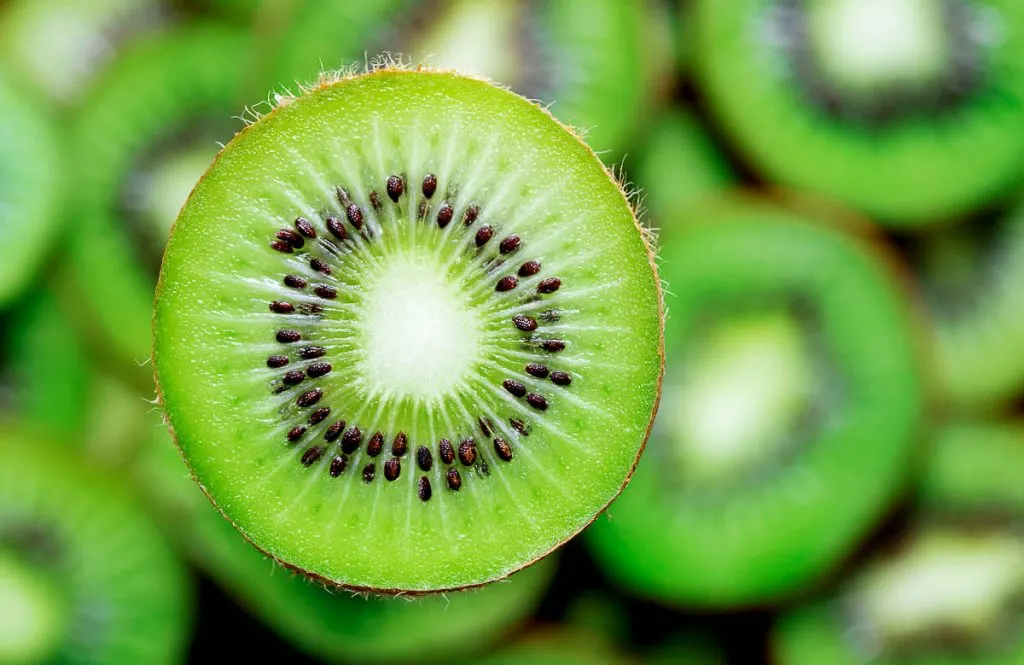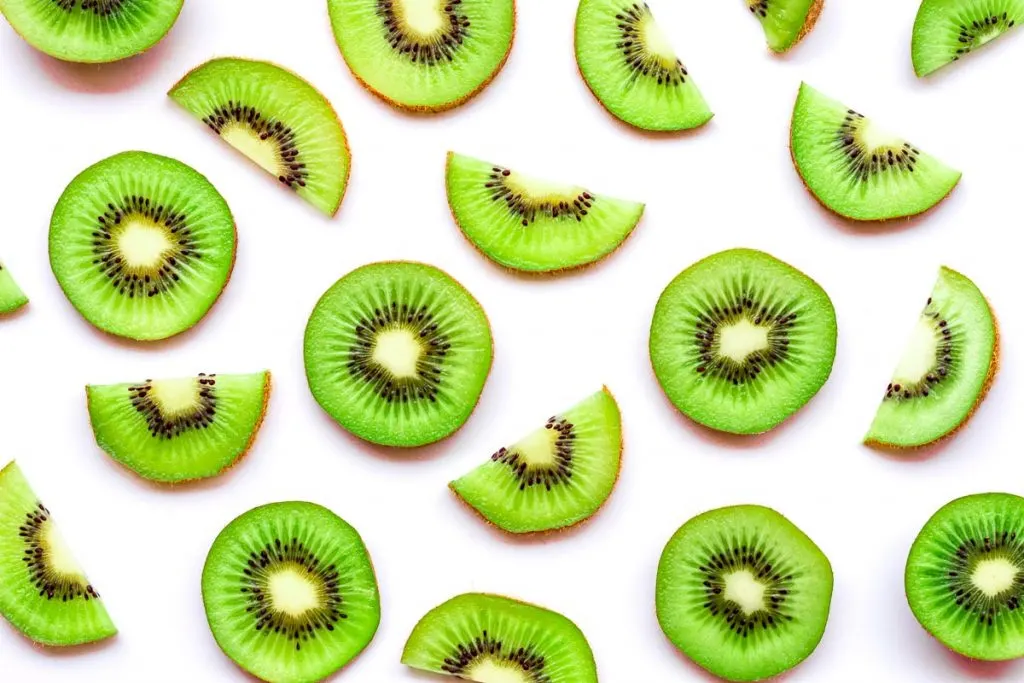Can your furry friend eat the kiwifruit? You are here because you want to know – can dogs eat kiwi, so that your dog stays safe with the foods in your kitchen. If you want to add human foods such as kiwis to your dog's diet, read this article first!
Dr. Jess describes the risks and the benefits of feeding kiwifruit to your dog, as well as which types of kiwi dogs can eat (if any!), and which is best left out of their food dish.

Dog food experts have arguments regarding the safety of serving certain kiwis to dogs.
Well, as delicious as kiwis are, is it actually a health threat to the dogs or are we over-reacting about this?
Let me, the veterinarian, explain my thoughts…
It’s always the best idea to double-check which foods your dog can and can not eat because many foods that are safe and healthy for humans are actually very harmful for your dog to eat, or even poisonous or deadly to them. Taste is never worth the risk of harming your pet.
That's why I am so glad that you are here making an informed decision before feeding your dog kiwi!
If you missed it, check out my article on if dogs can eat different forms of fish, mayo, or tuna fish!
What Do Dogs Eat?
Some dogs are not picky at all about what they eat. They’ll eat whatever you offer them- they're like vacuum cleaners sucking up anything you put in front of them and then some!
Some dogs are on the pickier side of things. Pickier pups can be harder to properly feed because they just won't eat any food we give them. Try feeding a picky dog something like okra!
A common canine diet for pet dogs consists of a complete dry or wet feed and possibly some form of supplements in some specific cases (however, not all pet dogs need supplements).
Foraging can also be included in the diet if the dog is allowed to roam, or the dog is feral, and of course there are treats that are a part of many dog's diets!
The diet of every dog breed will very when you are looking into a healthy and complete diet for your pup. So it is important to know when offering food to your dog, what constitutes a healthy choice, and what does not.
An improper diet could put your dog at risk of having problems properly digesting their food and absorbing nutrients correctly. And we don’t want that now do we???
So let’s talk specifically about kiwis, since that's why you clicked over here today, and talk about how it could affect your dog’s overall health and well-being.

Let's Talk Kiwifruit:
The kiwifruit is the berry part of a vine plant that is considered a perennial, which means that it can survive and come back year after year.
Called kiwi for short in the United States, the kiwifruit is a round or oval egg-shaped and sized fruit.
The fruit has a brown and distinctively fuzzy, thin but tough, outer skin that is edible.
Inside this fibrous skin is a soft green or yellow flesh with rings of very small black, edible seeds.
The kiwifruit is described as being anywhere from tart to sweet in flavor. The tender flesh is juicy because of it's high moisture content.
Like many other fruits, kiwi can become bruised from rough handling quite easily.
Kiwi Health Benefits:
Kiwis are a very popular fruit because of their sweet flavor, interesting fuzzy exterior and tender green centers.
Kiwis have many nutritional benefits as well as delicious benefits. Here is one summary of a kiwi's nutritional makeup:
“In a 100-gram (3.5 oz) amount, green kiwifruit provides 61 calories, is 83% water and 15% carbohydrates, with negligible protein and fat. It is particularly rich in vitamin C and vitamin K, has a moderate content of vitamin E, with no other micronutrients in significant content. Gold kiwifruit has similar nutritional value, but higher vitamin C content. Kiwifruit seed oil contains on average 62% alpha-linolenic acid, an omega-3 fatty acid. Kiwifruit pulp contains carotenoids, such as provitamin A beta-carotene, lutein and zeaxanthin.”
https://en.wikipedia.org/wiki/Kiwifruit

1. Vitamins and Minerals:
Kiwi contains many vitamins and minerals, including vitamin A, C, E, and K.
They also contain potassium, Folate, phosphorus, magnesium, iron, and calcium [source]. Potassium is an essential electrolyte that helps cells function. Potassium may help reduce the risk of high blood pressure, strokes, and even kidney stones [source].
2. Antioxidants:
Kiwi contains antioxidants [source], like carotenoids, that may help to prevent cell damage that harmful free radicals can cause. These antioxidants can help with things like preventing certain cancers and diseases.
3. Sugar Levels:
With how sweet their taste is, it shouldn't come to you as a shock, that a kiwi contain a high amount of sugar, just like many other sweet fruits.
This means that kiwis need to be fed carefully to those pets that have metabolic conditions such as diabetes in which blood sugar levels can be an issue.
4. Water Content:
Juicy kiwis have a healthy concentration of water that can help keep small bodies more hydrated. Just make sure not to over-indulge your little critter, because too much water is not a good thing either!
5. Immune Booster:
Kiwis contain vitamin C, which has been linked to healthy immune systems and to boosting immune systems in need of a little extra help [source].
6. Fiber:
Kiwi also has quite a bit of fiber in them.
This is great news because fiber helps with satiety, keeping the pet feeling full after eating for longer as well as helps keep the gastrointestinal tract moving [source] and flowing smoothly as it should.
Can You Feed Kiwi To Dogs?
While kiwis are not toxic to dogs and can be quite beneficial to some dogs, too much kiwi could lead to some health problems too.
Let me dive a little deeper and explain myself so you can make an informed decision on whether or not you should let fido eat kiwi off of your plate.
Do Dogs Like Kiwi?
Dogs are natural carnivores.
Some dogs find the flavor or juiciness of kiwis to be a delicious one, just some people love kiwis in or on everything they eat, from their fruit salads to their desserts.
So yes, some dogs like kiwi. Some dogs even LOVE it. But then, some dogs will turn up their noses to the fruit.

Can Kiwi Be Harmful to Dogs?
Before we can decide whether kiwi is safe to feed our dogs, we need to first understand some of the risks involved if we do feed our dogs the fruit.
I am not saying that you shouldn’t have any concerns with feeding your dog kiwi, because there are a few key things to keep in mind.
These are three of the factors to keep in mind:
Harmful Reason #1: Loose Stool/Diarrhea
Too much fiber can mean hypermotile, or increased movement, of one's digestive tract.
Some dogs are more sensitive to additional fiber in their diets, so they are more likely to have loose stool and in some cases, full-blown diarrhea.
Other dogs will not be impacted by any additional fiber in their diets.
Now, I have not seen this last scenario with my own eyes, I have had many people tell me that that was their experience.
Harmful Reason #2: Allergic Reaction to Kiwifruit
A dog can develop an intolerance or an allergy to any food, so there is always the possibility that your dog is allergic to kiwi.
If you suspect your dog is allergic to kiwis do NOT feed it to your dog.
If your dog is allergic to kiwi and accidentally ingests it, go to your nearest animal emergency room immediately.
When this happens, the attack sets off a hypersensitivity reaction and can result in any of the following symptoms:
Common symptoms of adverse/allergic reaction to food:
- Nausea/vomiting
- Diarrhea
- Itching/Increased grooming
- Fever
- Lethargy
- etc.

How Much Kiwi Can Dogs Eat?
This depends on the specific dog in question. Most the time, kiwi, given in small amounts periodically, are most likely just as healthy for your dog as it is for you.
Moderation is key here; never go overboard when feeding kiwi to your dog, no matter if your dog has a stomach of steel or not. Small amounts every once in a while is okay for most dogs.
Smaller dogs do not need as much kiwi as a larger dog to have the same effect.
Dogs with loose stool do not need, or need much less kiwi, than a dog that is constipated would need. Because of the fiber content in kiwifruit, I would bypass feeding any kiwi to a dog with any type of digestive issue, whether it be too loose of stool, or if it is a bout of constipation. Contact your veterinarian if either pops up for your pet!
The best thing to do to gauge how much kiwi you can feed your dog safely, would be to contact your veterinarian about the specific pet in question.
Are Kiwis Beneficial For Dogs?
The random lick of a piece of kiwi or a small bite as a treat is totally fine – it should not harm a healthy dog.
However, there’s no need to offer it in large quantities, as this can cause some major health issues for your pup, as I discussed above.
Basically, if your dog consumed a bit of kiwi, you don’t need to drive them straight to the vet to get their stomach looked over.
If they start showing any odd signs of being affected by this new food, contact your local veterinarian to get more information on what to do next.
So, yes there are some negative effects that can be seen with some dogs who consume kiwifruit.
Some of the health benefits for dogs who consume kiwi include:
- High Fiber: Fiber is great to keep the digestive system flowing smoothly and also helps dogs feel satiated (feeling full for longer after eating).
- Water Content: A high water content fruit means that your dog is more likely to stay well-hydrated. Every little bit helps!
- Low Fat: Again, if you are looking for lower-fat options to serve your overweight dog, kiwi may be a good add-on option. However, don't forget that kiwifruit does have quite a bit of sugar, which can derail a certain weight-loss programs that your pet may be on.
- Inflammation/Antioxidants: Multiple studies show that kiwis are a great source of anti-inflammatory compounds that help in fighting against inflammation.
- Vitamins and Minerals: A kiwi contains vitamin A, C, E, and K as well as a multitude of important minerals. For instance, vitamin C helps your canine companion stay safe and adequately protected from diseases and strengthens their immune system. Vitamin K is important in blood clotting. Vitamin E is important in the muscular and reproductive systems. I go on all day with how important and essential vitamins and minerals are for your pet!
- Diabetes/Blood Sugar: Kiwis may help with glucose levels and glucose metabolism in the bloodstream.
How About Kiwi Stems and Kiwi Leaves?
Just like anything else that they can stick in their mouths, these items can be a choking hazard so I do not recommend offering your dog these while snacking on this fruity treat.
Plus…. most dogs will likely not enjoy the stem of leaves from the kiwi.
There are other things you can give your dog to chew on that would be better and safer for them.
Can They Eat Kiwi Seeds?
They definitely can eat the very small kiwi seeds!
The kiwi seed is quite small and slippery and should be of no choking issue to your dog.
Can Dogs Eat Kiwi Skin?
I do not recommend feeding the skin of kiwis to your dog unless it is cut into small pieces.
Kiwi skin is tough and fibrous, yet the inside of the skin that contacts the juicy flesh is moist and slippery.
Given the fact that the skin is both tough and slippery, makes it a choking hazard in my book.
So I would recommend removing the skin before offering your furry friend any kiwi.
Can They Eat Dried Kiwis?
The higher sugar content of dried fruit such as dried kiwis makes me always say a resounding no.
Do not feed your pet any dried kiwi pieces, stick with the fresh fruit.
Can They Eat Frozen Kiwis?
Frozen kiwis are quite hard and are a potential choking hazard, so I do not recommend offering your pet any frozen kiwi, even if they are already in smaller pieces.
Can They Eat Kiwi Jam or Preserves?
No, no, nope.
Do not ever feed your dog jelly or jam as these are high in sugar.
High sugar content is not good for your furry friend, so please stay away from the jellies and jams!
How to Serve Kiwi to Dogs:
After checking with your vet to make sure that kiwi should be a part of your dog's menu, start by offering your dog 1 teaspoon worth of kiwi at a time.
If your dog does not show any adverse reactions after 24 hours or more, then you are likely safe to continue feeding your pup kiwi, gradually increasing the amount according to your vet's guidelines.
Keep the following in mind when serving food to your dog:
And remember that dogs need more than a bowl or plate of kiwi – they need a complete and balanced diet.
Whichever complete food you choose for your dog, it needs to have the AAFCO label indicating the diet is complete and balanced for your dog’s life stage.
AAFCO approved foods have gone through testing and compliance to make sure that the diet is safe and healthy for your pet.
Dogs already get everything that they need from their kibble or canned food.
How Much Kiwi Can My Dog Have?
Can dogs eat kiwi? As I mentioned previously, it depends…
Most dogs are safe consuming a teaspoon or two of kiwi per serving.
I highly recommend contacting your vet first before starting your dog on kiwi treats, and also suggest that you start by offering your pup a small amount of the fruit and then working up to a full amount.
A little bit of kiwi typically goes a long way!
It's always better to be safe than sorry!
Talk to your vet about the appropriate serving size of kiwi for your dog.

Can Puppies Eat Kiwis?
I would never advise a puppy owner to feed kiwi to their puppy unless your veterinarian is recommending it due to specific medical needs.
Why do I say this? Because your pup's first months of life should consist of specialized puppy diets approved by your local veterinarian upon puppy examination.
Puppies tend to have an even more delicate digestive system than adult dogs so giving your puppy kiwifruit might cause diarrhea, vomiting, or other adverse reactions.
What to do If Your Dog Eats Kiwi Accidentally:
If it is just a lick or two of kiwi, just watch them for the rest of the day just in case, for any signs of adverse reaction.
If you are concerned with this small amount, of course, contact your veterinarian right away. Most dogs can tolerate a small amount of kiwi on occasion and do just fine.
If it is a large amount of kiwi, contact your veterinarian right away to discuss details and what to do next.
It is extremely likely that your vet will request that you bring your dog in immediately to get evaluated if they have gotten themselves into a large amount of kiwi, or a rotten kiwi. We vets want to help and we will best help if we are notified right away.
Trust me, us vets are happy to help!

The information provided in this article is not a substitute for professional veterinary help.
![[Vet Explains Pets]](https://vetexplainspets.com/wp-content/uploads/2024/09/cropped-vetlogo-199x66.png)
